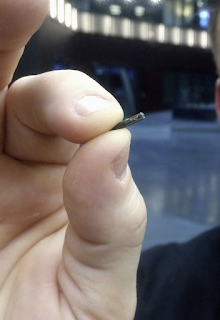Getting Chipped?
Call me suspicious, but I just want to ask this up front: would you implant a data chip in your right hand in order to have a more full-proof method of protecting your ID, credit cards, and bank accounts?
The cover article in April’s AARP Bulletin, discussed the challenges facing consumers in this online world of financial transactions. The United States had over 16 million victims of identity theft in 2017. Scammers reaped nearly $17 billion.
Our passwords just aren’t stealthy enough anymore. Biometric authentication with eye scans and thumb prints can help beat some of the scammers. Facial and voice recognition are being used more often to confirm identity. It sounds good until the companies storing your photo ID get hacked.
The safest solution is already in place in Sweden. A tiny chip the size of a piece of rice is inserted between the thumb and forefinger. No more lost car keys, no need for your work ID badge, no lost or stolen credit cards. Nearly un-hackable. Simple, easy, and you haven’t lost anything—except your personal privacy. The chip is in you, tracking your purchases, and everywhere you use it.
AARP calls implanted chips the extreme solution, but the fact that they are even writing about it makes me wonder if it will become normalized over time—kind of like cell phones did.
Jowan Österlund, the owner of Swedish chipping company, Biohax was asked what if implanted chips were used wrongly by an authoritarian government? He replied, “Oh no. Please, I hope that will not happen.” Technology is our friend, until it isn't.
So, would you get chipped? Not me.
It forced all people, small and great, rich and poor, free and slave, to have a mark on the right hand or forehead. Without the mark of the name of the Beast or the number of its name, it was impossible to buy or sell anything. Revelation 13:7 MSG
Photos: Screenshots from Biohax International, Janus Engel/ Fortune Magazine




